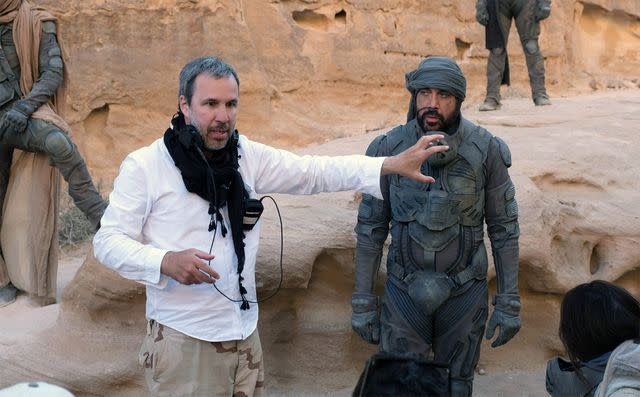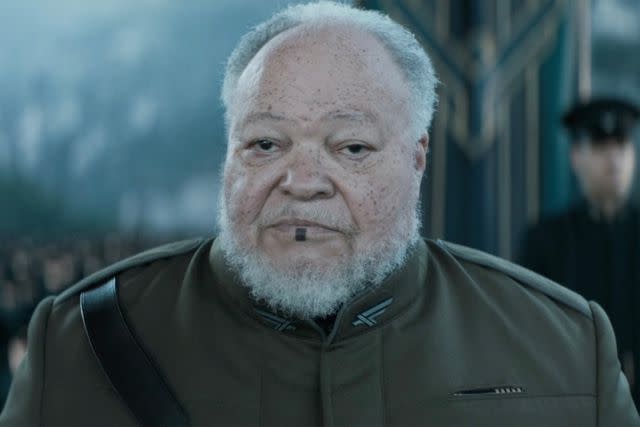“Dune: Part 2” director reveals the most painful choice he had to make for his adaptation

- Oops!Something went wrong.Please try again later.
"There's always some kind of violence toward the original material," Denis Villeneuve says. But here's the character he's most sad about cutting.
Warning: This article contains spoilers about Dune: Part Two.
Even with two movies that are each longer than two hours, director Denis Villeneuve wasn’t able to bring every single element of Frank Herbert’s Dune to the screen. When speaking with EW for our recent cover story on Dune: Part Two, the filmmaker revealed the hardest cut he had to make from the source material.
"When you adapt, there's always some kind of violence toward the original material," Villeneuve tells Entertainment Weekly. "You have to change things, you have to bend, you have to make painful choices."

Everett Collection
Denis Villeneuve and Javier Bardem on the set of 'Dune: Part Two'Dune: Part Two is not afraid to make changes to Herbert's original story. The Fremen warrior Chani (Zendaya), for example, is much more independent in the new film than she is in the book. She expresses open opposition to the ascension of her lover Paul Atreides (Timothée Chalamet) to the status of Fremen messiah, rather than loyally standing by her man. Paul’s sister Alia only appears as a fetus (albeit one awakened to universal consciousness) and briefly as a vision of her older self in a dream, portrayed by Anya Taylor-Joy.
But several characters who play significant roles in the back half of Herbert’s Dune don’t appear on screen in Dune: Part Two at all. Although Lea Seydoux shows up as Lady Margot Fenring, an agent of the Bene Gesserit, we never meet her husband, Count Fenring, who in the book is a powerful friend of the Emperor (Christopher Walken). Viewers also don’t see any more from Paul’s mentor Thufir Hawat (Stephen McKinley Henderson) in Villeneuve's second film, even though in the book he survives the massacre of House Atreides by House Harkonnen. Henderson was listed among the film's cast on Wikipedia before its release because many assumed he would play as large a role in the film as he does in the book — but alas.
"One of the most painful choices for me on this one was Thufir Hawat," Villeneuve admits. "He's a character I absolutely love, but I decided right at the beginning that I was making a Bene Gesserit adaptation. That meant that Mentats are not as present as they should be, but it's the nature of the adaptation."

Warner Bros. Pictures
Stephen McKinley Henderson in 'Dune'Mentats are, essentially, human computers. In the world of Dune, artificial intelligence has long since been destroyed and outlawed in a campaign known as the Butlerian Jihad. There are two replacements for the functions of thinking machines. One is the spice melange, which can psychedelically expand one's mind and allow navigators from the Spacing Guild to chart spaceship routes over long distances without crashing into each other. The other is Mentats, humans trained from a young age to perform high-level mathematic and strategic calculations. All of the noble Great Houses in the Dune universe have their own Mentat, like Maesters in Game of Thrones.
Hawat was the Mentat for House Atreides. In 2021's Dune, we saw his powers in action when Duke Leto Atreides (Oscar Isaac) wondered aloud how much money was spent on the imperial delegation announcing his new stewardship of Arrakis; Hawat's eyes rolled back into his head as he ran the numbers. Viewers also met Piter de Vries (David Dastmalchian), the much creepier Mentat for House Harkonnen. Piter was killed during Duke Leto's suicidal attack on the Baron.
In the book, this leads the Baron to take Hawat prisoner and force him to become the new Mentat for House Harkonnen. This is a tragic storyline, with a noble character being forced to serve the enemy who murdered his friends and family, and trying to find some redemption by the end. But there's only room for so many characters, even at a 150-minute runtime.
As Villeneuve says, the film focuses more on the machinations of the Bene Gesserit. Even as the film builds to a climactic macho confrontation between Paul and Feyd-Rautha Harkonnen (Austin Butler ), we see Princess Irulan (Florence Pugh) and Reverend Mother Gaius Helen Mohiam (Charlotte Rampling) making contingency plans in the wings. Amid Paul's triumph, the Reverend Mother isn't cowed: "There are no sides."
If Villeneuve gets to fulfill his ambition of making a third film based on Herbert's Dune Messiah, we can expect to see more from the Bene Gesserit as they try to manipulate Paul's new imperial regime from within and without; both Irulan and Mohiam play major roles in that story. In the meantime, sorry to these Mentats.
Want more movie news? Sign up for Entertainment Weekly's free newsletter to get the latest trailers, celebrity interviews, film reviews, and more.
Related content:
Read the original article on Entertainment Weekly.

